
What is happening across North Africa, from Mauritania to Libya and many points in between, is of critical interest to European actors, like reported by eurasiareview.com. European strategic interests are increasingly at stake because of the struggle over North Africa’s immediate future. Libya is a central focus, but the entire North African coast and its hinterlands of the Sahara are within the scope of the current contested space.
France’s strategic interests in the region are driven by security requirements, from immigrants to energy. The Sahel and the Maghreb fall within the current scope and this activity is seen in Mali, Niger and Libya. It’s likely that a motivating factor for Paris’ reported support for Khalifa Haftar was to stabilize neighboring Chad, where the main heart of French interests lies. Algeria and Sudan also need to be considered in terms of the strategic layout for Paris. France’s North African mission is turning into a major security priority.
Italy is seeing its remaining strategic interests fall outside of its immediate arena of control in Libya, and it is arguing with France sharply over the latter’s objectives in Libya. Rome is ultimately sharing many of the same security concerns involving immigrants and energy. Both France’s Total and Italy’s Eni have major investments and infrastructure throughout the region.
To be sure, relations between Italy and France, who are traditionally close allies, have grown cold since the far-right League and anti-establishment Five Star Movement formed a coalition government last year and targeted French President Emmanuel Macron. Italy accuses France and specifically Macron of doing nothing to help handle the hundreds of thousands of mainly African migrants who have reached Italy from Libya in recent years.
Thus, France and Italy are functioning in an area of power politics to determine what is best for their respective security interests, rather than for a joint European approach, especially as they are the two countries to have been facing the North African security problem for decades. To be at this juncture illustrates that no lessons have really been learned about the requirement for European cooperation on such serious matters.
Beyond the France versus Italy divide, the UK is suffering from Brexit and it shows in North Africa because London is focused inward, except on a few key issues outside of this specific arena. Brexit is also naturally dividing Europe at a key juncture in North African history, as many countries are in various states of transition.
North Africa’s many recent changes in leadership have been welcomed by the EU. The bloc’s policy is concerned with the countries of the region adhering to counter-terrorism and counter-narcotics programs during this period of time. But immigration remains the highest priority and, as has been the case since the migrant crisis began, there has been a lack of adherence by member states to central EU policy. Internal tensions within key EU states have created the environment today where France sees the necessity to step forward ahead of continental interests.
Germany seems to be late coming in to the game, and it is focusing on its neighbor to the east, Russia. It was under the German chairmanship of the UN Security Council that a joint statement against the advance of Libyan National Army commander Haftar toward Tripoli failed. Russia, as it has so many times before, stood in the way. More to the point regarding the German government’s view is that Berlin is standing back from the French-Italian confrontation over North Africa and specifically Libya. The response from German government spokesman Steffen Seibert was “say nothing” to the question of whether Germany knew about the French support for Haftar. Now the German Foreign Ministry is assuring that it is “in discussions” with its partners in Italy and France.
Germany retreated on the topic when it came to mediating among its European allies. It failed to openly confront countries like France and Italy over their disjointed stances. This inability to agree opens the door to the ongoing transition being done on Arab terms in a more robust way then previously seen.
Russia sees European disunity over Libya and North Africa as a weakness and consequently has been achieving an impressive build-up of good, stable relations with many countries across the region. The transformation of key states such as Algeria, Libya and Sudan is playing perfectly into Russia’s favor because of this broken security environment. European states need to recognize that their own internal bickering is creating the conditions for Moscow to become an alternative center, much like the Kremlin did with much success in Syria.
Overall, Europe’s division is helping to reshape the North African security environment by ceding some of the responsibility to regional states. These states are thus getting heavily involved, which can be seen as a requirement of key Arab states to help make up for Europe’s shortcomings and to partner with those who demonstrate the most resolve and strength.


